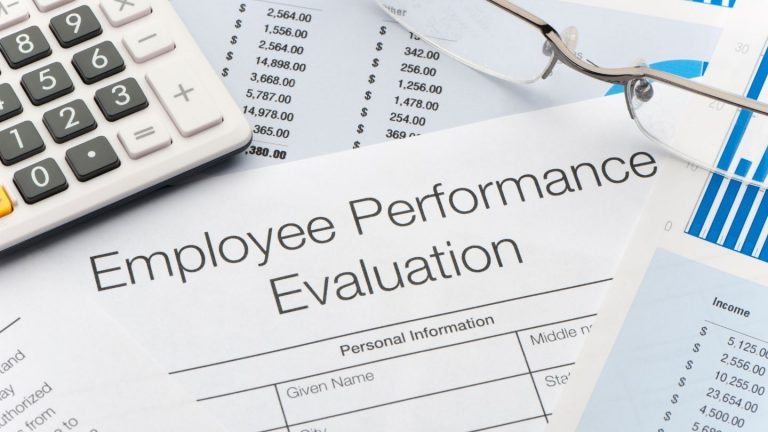Businesses typically conduct employee evaluations on a regular basis, usually once a year. The evaluation usually includes a review of how the employee’s duties and habits compare to expectations. In many cases, evaluation results play a critical role in promotions, bonuses, and raises. Evaluations help employees better understand what is expected of them, improve communication between management and employees, and provide them with recognition for their efforts.

How to Evaluate an Employee
A company must have a standard evaluation framework in place and evaluate each employee against those standard metrics in order to effectively evaluate their employees. A step-by-step guide to evaluating employees:
1. Establish Performance Standards
Clarify what an employee in a particular role should accomplish and how the work should be done by setting clear performance standards. Employees who hold the same position must adhere to the same standards. Performance standards should be attainable and directly related to the job description of the individual.
2. Set Specific Goals
Goals should also be specific to each worker, unlike performance standards, which can apply to multiple workers. Goals are specific to the strengths and weaknesses of each employee and can help them improve their skills or learn new ones. Establish reasonable and relevant goals with each employee.
3. Take Notes Throughout the Year
Throughout the year, keep track of your employees’ performance. For each worker, create a performance file. Whether positive or negative, keep track of notable achievements and incidents. Remember that you can give immediate feedback to employees when something stands out as well, you don’t have to wait until the year-end review process to give praise or constructive criticism.
4. Be Prepared
When it comes time to give an employee evaluation, it’s best to prepare in advance. Review the employee’s documentation before the meeting and make notes on what you want to discuss with the employee. A performance review should be mainly about the positive aspects of the employee’s performance, with some helpful advice on how to improve in the future. If a worker’s performance was mostly negative, they probably wouldn’t be working for you.
5. Be Honest and Specific with Criticism
If you have to provide criticism in an evaluation, be honest and straightforward. Avoid sugarcoating or downplaying the situation, which can create confusion for the employee. Then provide clear examples on how the employee can grow and improve in the future.
6. Don’t Compare Employees
During an employee evaluation, the performance of each employee is evaluated against a set of standard performance metrics. Comparing an employee’s performance to that of another is unproductive and can lead to unhealthy competition and resentment. Focus on your evaluation framework, not the performance of others.
7. Evaluate the Performance, Not the Personality
Instead of focusing on the employee’s personality traits, you should evaluate how well they perform their job. Making judgments about an employee’s personality can make them feel attacked, creating a hostile environment. For example, instead of criticizing an employee for being immature or emotional, it is more productive to cite specific examples of the employee’s actions in the workplace which demonstrate those characteristics. Don’t take criticism personally, always link it to the work.
8. Have a Conversation
An employee evaluation shouldn’t be a one-way street where the manager gives feedback and the employee listens to it. A productive employee evaluation should take the form of a conversation between you and the You are employees. Listen to your employees’ concerns and how they would like their careers to develop. Ask how you and your team can help the employee achieve their career goals. An employee may also provide a self-evaluation of how they think they performed at their job for the past year. During a performance review, the employee should evaluate the workplace, their managers, and themselves, as well as reflect on their professional growth.
9. Ask Specific Questions
During the evaluation, you might find it helpful to enter the room with specific questions you want to discuss with the employee. Here are a few questions you can ask employees to start a conversation and gain valuable feedback:
- What do you hope to accomplish within the company this year?
- How can the department help you achieve your goals? What resources or support do you need?
- How will you meet your business goals this year? What will be your biggest challenges?
- Would you like to receive feedback on a regular basis?
- What can I do to be a better manager to you?
- How can the organization help you achieve your long-term career goals?
- This year, what new skills would you like to develop? Can we provide training to help develop those skills?
10. Give Ongoing Feedback
An employee evaluation should be an ongoing process throughout the year, not a one-time task. Feedback throughout the year and checking up on employees to see how they’re doing with their yearly goals can improve worker morale and keep them on track at work.
What is a Performance Evaluation?
An employee performance evaluation is a regular assessment and review of the employee’s performance. Managers typically perform a full performance evaluation annually, as well as regular check-ins throughout the year. An employer can set clear expectations and measure the employee’s success with performance evaluations. The information gathered as part of a performance evaluation can help drive decisions about pay raises, promotions and layoffs.

Performance reviews often include a manager’s assessment of the employee’s performance as well as a self-evaluation conducted by the employee. Metrics should be defined clearly to evaluate performance against specific goals.
What’s the Purpose of Employee Evaluation?
Evaluation of employees serves a variety of purposes in an effort to improve the individual’s performance and the company’s culture. The following are some of the benefits of professional employee evaluations:
- They help employees understand what’s expected of them
- This gives the manager a chance to better understand the employee’s strengths and motivations
- Employees receive feedback on how they can improve their performance in the future
- Employees and managers can use them to plan for the future
- Reviewing people objectively based on standard metrics can help evaluate promotions, raises, and bonuses fairly
Looking For Best Employee Engagement Software for Your Company? VITE is the perfect fit for you!
